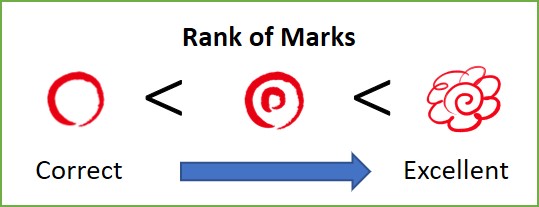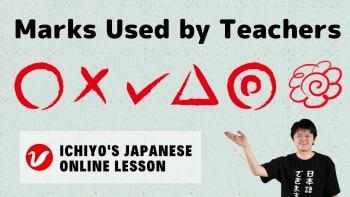The following marks are often used by teachers. When we teach Japanese, we often use them. The meanings of some marks are different from English. Please memorize the meanings in Japan.
Marks and their meanings
| Mark | 〇 | ✕ |
| Name | 丸/マル | バツ |
| Romaji Reading | maru | batsu |
| Meaning | correct, okay | wrong, impossible, bad |

| Mark | ✓ | ✓ | ✓ |
| Name | チェックマーク | レ点 | ペケ/バツ |
| Romaji Reading | chekkumāku | reten | peke/ batsu |
| Meaning | check mark | check mark | incorrect, wrong |
“Check mark” is called「チェックマーク」,「レ点」or「ペケ」. Both「チェックマーク」and「レ点」mean “check mark.” When the mark「✓」means “incorrect” or “wrong,” we call it as「ペケ」or「バツ」. Japanese teachers usually use the mark「✓」when the answer on the answer sheet is incorrect.

「✓」and「✕」have the same meaning when teachers mark their students’ tests. 「✓」is often used than「✕」 on answer sheets.

| Mark | △ | ◎ | |
| Name | 三角 | 二重丸 | 花丸 |
| Romaji Reading | sankaku | nijūmaru | hanamaru |
| Meaning | partially correct | perfect | perfect, excellent, great |

「花丸」is the best mark a teacher can write.
Examples of how we use these marks in our Japanese lessons
✕ 私は北海道に馬をたくさん見ました。
〇 私は北海道で馬をたくさん見ました。
In the example,「✕」indicates that the first sentence is incorrect and「〇」indicates that the second sentence is correct.
私は北海道で馬をたくさん見ました。(I saw a lot of horses in Hokkaido.)
私 (I)、北海道 (Hokkaido)、~で (in/at ~)、馬 (horse)、たくさん (many)、見ました (saw)
From a member:
Please check my Japanese sentence. I want to say “My name is Emma.”
The situation is self-introduction in my new company.
私の名前はエマです。
Our feedback:
△ 私の名前はエマです。
〇 私は、エマと申します。
We usually don’t use the phrase「私の名前は~です。」 in business. We use「私は~と申します。」instead.
In the example,「 △ 」indicates that the first sentence is not incorrect, but not perfectly correct either.「〇」indicates that the second sentence is correct and better.
私の名前はエマと申します。(My name is Emma.)
私 (I)、私の (my)、名前 (name)、 エマ (Emma)、~と申します (my name is ~)
To not misunderstand our explanations, please memorize the meanings of these marks. We look forward to checking your Japanese and answering your Japanese questions.


